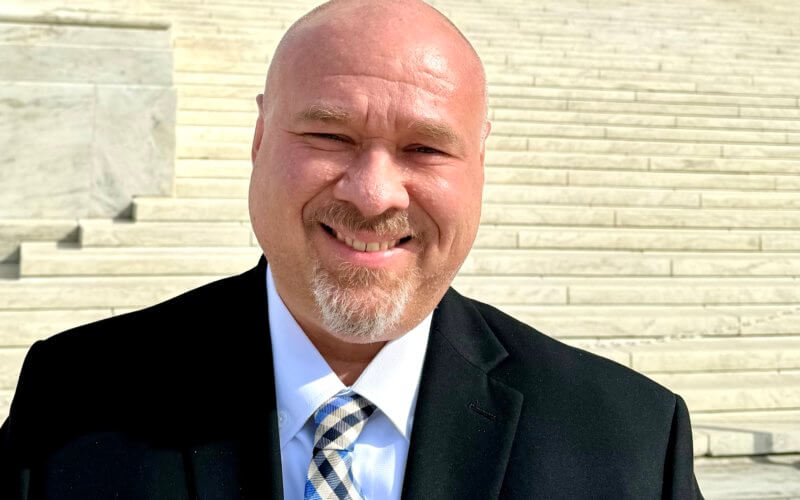
Jason Shepard, professor of communications at Cal State Fullerton, says the First Amendment is a key focus of several cases before the U.S. Supreme Court in its current term. On Feb. 26, he was in Washington, D.C., to hear oral arguments in two cases involving content moderation on social media, including Facebook, YouTube and X.
“The Supreme Court is being asked to decide whether states can control how social media platforms regulate content on their sites,” Shepard said. “These cases could create a major precedent in First Amendment law.”
The cases, Moody v. NetChoice and NetChoice v. Paxton, involve laws in Florida and Texas that limit the ability of social media networks to moderate content on their platforms based on viewpoint.
Shepard is chair of the Department of Communications and studies the role of the First Amendment in American journalism, democracy and culture. He received press credentials to cover the Court’s oral arguments for the “Online Legalities” column he writes for California Publisher, the newspaper for the California News Publishers Association.
We asked Shepard five questions about the case and the court’s oral arguments.
Who controls what gets posted on social media?
Generally, since social media platforms are private companies, the companies get to decide what they want to publish on their platforms. While users have wide latitude to publish what they want, platforms enforce terms of service and block certain offensive and harmful content. Because of these sites’ growing ubiquity as the “digital public square,” many worry that social media platforms have too much power in the marketplace of ideas.
What prompted Florida and Texas to pass these social media laws?
After former President Donald Trump and others were banned from Twitter (X) and Facebook following the Jan. 6 insurrection, the states of Florida and Texas accused the platforms of having an anti-conservative bias. Their state legislatures passed laws aimed at prohibiting social media platforms from blocking content based on viewpoint and “deplatforming” people who violated their terms of service.
How does the First Amendment apply to the Florida and Texas laws?
The First Amendment protects people from government censorship, and lower courts blocked the laws as violations of the social media platforms’ First Amendment rights. However, the states argue that the social media companies are more like cable or telephone companies that are regulated as “common carriers,” which are conduits for expression rather than speakers themselves.
How is the Supreme Court likely to decide, and how might this case affect other laws?
The Supreme Court is asked to decide whether the states have a right to set content rules for social media, or whether the First Amendment prohibits the government from doing so. Many of the justices seemed skeptical of the laws in their questions during oral arguments. But those questions were nuanced and varied, suggesting they are still struggling with how the First Amendment does or does not allow government to regulate content online. For example, the decision could have a major impact on the constitutionality of a California law that targets social media practices aimed at children.
How will this experience affect your teaching of communication law?
Attending Supreme Court arguments in a major First Amendment case is a “bucket list” event for me. I think seeing the justices in action with my own eyes and ears will help me humanize and explain to my students the ways in which justices and lawyers conduct themselves in an oral argument and how arguments shape court decisions that we read and study in class.